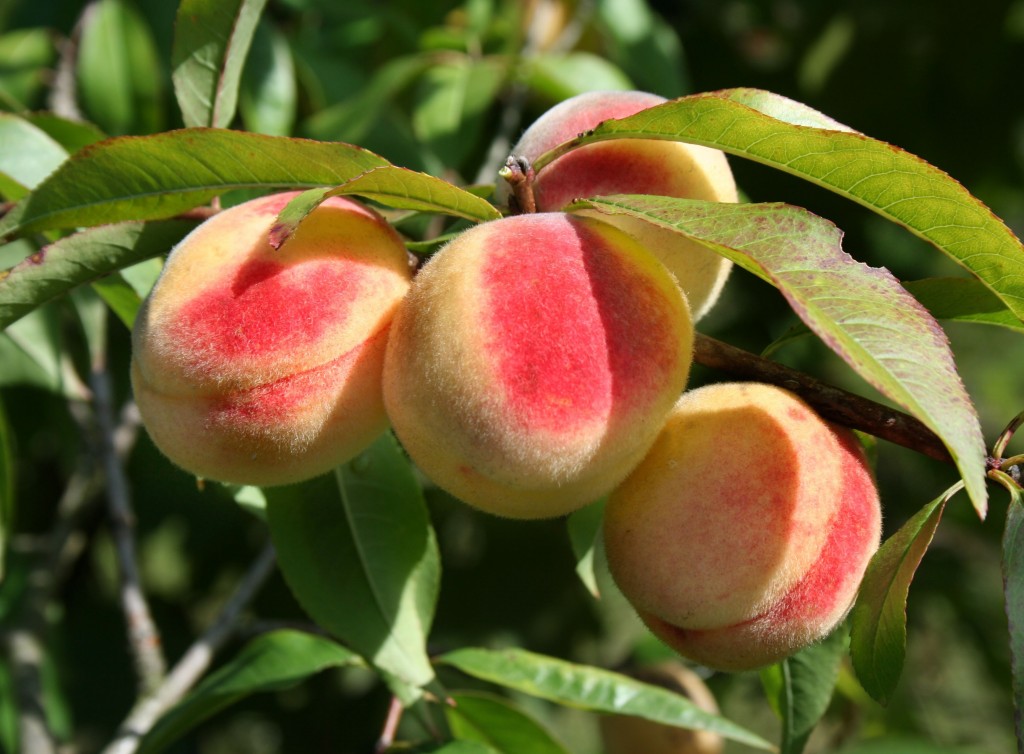
by Guest Blogger
Peach Fuzz Lishma (for its own sake):(“Peaching, Not Preaching”)
 Who picks peaches in August? Certainly not people like me, a rabbi who always anticipated the Jewish High Holidays by beginning to think about writing sermons as early as May. And by August – don’t ask!
Who picks peaches in August? Certainly not people like me, a rabbi who always anticipated the Jewish High Holidays by beginning to think about writing sermons as early as May. And by August – don’t ask!
But this year is different – now I’m semi-retired (and my husband retired 6 months earlier) and we are out on a weekday (!) in August picking peaches at Larriland Orchard in the countryside not far (but very far psychologically!) from D.C. Perfect sunny day, not humid, breathable air unlike much of the rest of the summer.
The two young women who are handing out the baskets for peach retrieval explain how to select the best peaches. No green on the flesh, a little hard (they’ll ripen in 3-5 days), these rows over here, not the ones farther back. For a born-and-bred city girl like myself, these directions are invaluable. And next to apples (for which I’ll return in a month), peaches are the easiest fruit to pick. The basket fills quickly, long before I’m tired or bored.
As we return to the vending stand to pay for our peaches, we find the two young women (interns? members of the family?) discussing the problem of their sensitivity to peach fuzz, how their constant exposure causes a kind of allergic reaction. Who knew?
Returning to the car, I begin contemplating this phenomenon, heretofore unbeknownst to me. Peach fuzz… the dark side of nature… environmental hazards?.. and suddenly, I realize what I’m doing. I’m thinking “sermon”; how can I possibly use this anecdote in a sermon?
But I don’t need to do this anymore. My only responsibility now is to eat the peach; and several nights later, to bake a pie or two to share with my book group. I don’t need to derive any powerful lessons (whether actual or contrived) from the orchard experience.
It’s a new way of living – but fortunately, as a Jew, I know a term for it – “lishma”. We are urged to study the Torah, for example, “lishma”, for its own sake, but not because we will derive some advantage – economic, professional, psychological – from doing so, but simply “for its own sake”. And so with peaches, and on a more macro level, nature itself. After 31 years of preaching, I need to re-learn how to do this.
In the meantime, I’m still a student at heart, so I can’t resist a peek at on-line descriptions of peaches and peach fuzz. I learn from Wikipedia that peaches are first mentioned in Chinese documents in the 10th century B.C.E., although the name “peach” derives from “malum persicum” (“Persian apple”); that Thomas Jefferson had peach trees at Monticello; and that there seems to be some debate about whether allergic reactions to peaches come from a reaction to the lipid transfer protein (LTP) in peaches, or the bristles on the fuzz itself.
My guess is that had I been preparing a sermon, I would have focused on either the hidden and unexpected dangers of nature (then connecting to the earthquake and hurricane of this meteorologically-challenging summer); or Korean traditions about the peach trees’ association with longevity and happiness. And there’s apparently also a Vietnamese story from the 18th century as well…
But for now, for this year, I’ll just stick with the tantalizing taste of the peaches themselves. And really appreciate them. There’s a lesson in that, too, especially for my over-achieving baby boomer cohort heading into retirement. Peach fuzz lishma… Nature for its own sake… life for its own sake.